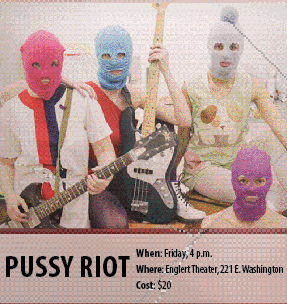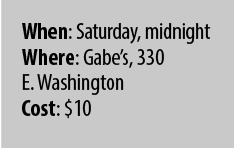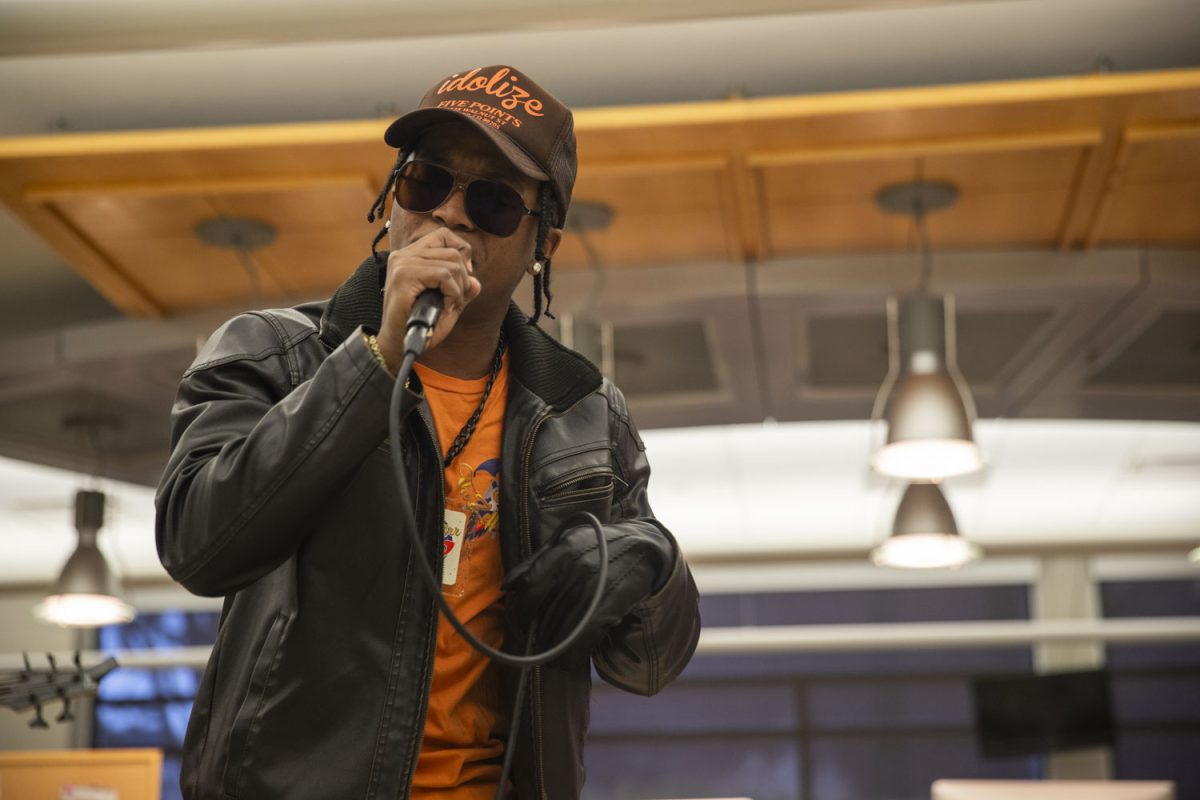The Daily Iowan looks ahead to a weekend of culture and creativity, courtesy of the second Witching Hour Festival.
The Witching Hour will fall upon Iowa City this weekend, but no ghosts or demons will be here, just a lineup chock-full of artists, writers, producers, comedians, and intellectuals, among others.
Witching Hour will run from about 3 p.m. Thursday to midnight on Friday, with the events located throughout downtown Iowa City.
Some of the guests include Pussy Riot, a Russian feminist punk rock protest group, Jen Kirkman, a comedian dubbed as “the thinking person’s comedian”, and the podcast Criminal, hosted by Phoebe Judge. Criminal was the winner of a 2015 Third Coast International Audio Festival “Best Documentary” award.
Witching Hour brings in a wide variety of guests, performers, and lecturers in order to foster discussions about the nature of ideas and creativity, as well as the creative process.
Andre Perry, one of the organizers behind the festival as well as executive director at the Englert, said he wants to bring down the wall between the audience and the participant at these sorts of gatherings.
“It’s about art and seeing performances,” he said. “This is really about interacting; it’s an experience that includes performers and audiences and that barrier doesn’t exist.”
Perry continued by saying he wants to move the festival away from the typical model of boasting four or five headliners, and toward a focus on four or five big ideas.
“This festival is an attempt to bring as many different types of people into the room at the same time,” he said. “We want to encourage people to take part and trust something good will come of the experience.”
Matthew Steele, another festival organizer as well as the publisher of Little Village, said he wanted to be involved because of the opportunities for creation in a city of so many creators.
“You have that moment of alchemy,” he said. “You went in with one thing, you drew inspiration from a variety of sources that pushed you in a new direction. Then you come out with a completely new thing.”
But, as all organizers hope, Steele wants this to grow into a much larger event.
“There’s a chance if we can really do a topnotch exciting event that all of the artists and the public figures that came to Iowa City had an experience like they never had before, we could see it snowball and become a cultural event,” he explained.
Steele also emphasized the organizers’ desire to bridge class divisions, and make this as accessible as possible to their potential audiences.
“We’re dedicated to bringing people into this [cultural] space that would otherwise not have done,” he said.
— by Claire Dietz
Pussy Riot
Headlining the Witching Hour Festival is one of the members of the punk guerilla group Pussy Riot, who will appear in a conversation led by music critic Jessica Hopper.
In February 2012, a Russian Orthodox church in Moscow became the setting of an iconic scene. Five women — clad in neon dresses, faces concealed by pastel balaclavas — thrusted fists, shredded guitars, and bellowed the lyrics to their “punk prayer.”
“Virgin birth-giver of God, become a feminist,” Pussy Riot cried at the Cathedral of Christ the Savior. “Become a feminist. Become a feminist.”

Framing their performance, and protest, is the striking gold, whites, and blues of the alter. Pussy Riot’s protest — a statement on not only the church’s support of Russian President Vladimir Putin, but on the nation’s concept of personal freedom and justice — and subsequent arrests sent shock waves.
Three of the five members were charged with “hooliganism motivated by religious hatred.” resulting in two members — Nadezhda Tolokonnikova and Maria Alyokhina — serving 21 months of their three year sentences. Their plight caused an international stir as human-rights groups condemned the imprisonments even while Pussy Riot’s home nation was divided in opinion.
In one sense, the stir caused by their protests highlighted the timeless resilience of punk as a tool against oppression, against unjust power. Pussy Riot entered a long tradition of civil society tackling the state with only drums, guitars, and a voice that screams to sing.
“Punk culture has taught us that to be moderate and restrained is not always the correct choice,” Tolokonnikova said at the fifth-annual Women in the World Summit. “When your intuition is telling you that the time has come to leave behind your moderation, do it.”
On Friday at 4 p.m., Alyokhina will be at the Englert Theater, joined by journalist and collaborator to Pussy Riot’s news service, Mediazone, Alexandra Lukyanova (a.k.a. Sasha Bogino) in a discussion on the group and human rights.
Guiding the talk is music critic Jessica Hopper, former editor at The Pitchfork Review, a Pitchfork senior editor and feminist punk reporter since the age of 16. While not prone to Pussy Riot’s visceral demonstration, Hopper’s essays and criticism of everything from the Emo movement to Lana Del Rey have provided a necessary voice in a macho music industry that often overlooks or marginalizes women musicians, writers, and fans.
“Any door that opens for me, I’m trying to open it for other people,” Hopper said in an interview with Time.
For many, her tireless voice was one of the few that said girls had the right to listen to the music that moved and inspired them.
“I really want [to say to] girls and women and people who sometimes have had the way that they care about music marginalized as “fan-girling,” how we care is totally real, and you are included in this,” Hopper said in the interview.
This year her collected essays, reported pieces, zines and reviews were published in her new book, The First Collection of Criticism by a Living Female Rock Critic.
The title itself is a stab at a misogynist system Hopper and the female preceding pioneers of music criticism have rallied against. These voices and opinions have always existed, the title says, but the road to publication has been paved with condescension.
“It starts a conversation, it plants a flag, it makes space for other people, it sets a precedent, it is a pretty active “F-U” to anyone that’s turned down a book pitch from a woman,” she told Time. “I’m not the first down my path, and my introduction speaks to that.”
— by Tessa Solomon
Jen Kirkman
The comedian Jennifer Kirkman describes herself simply as someone who grew up watching comedy, like everyone else. Except for her, it was more than just watching; it was also education. On Saturday at 9 p.m., years into her career as a successful modern-day comedian — and with a new special on Netflix titled I’m Gonna Die Alone: (And I Feel Fine) — Kirkman will take the stage at the Englert for the Witching Hour festival.
For her, watching comedy as she grew up helped her develop what she needed to pursue her career.
“The skills I learned in the family unit turned out to be the exact skills you need to be a road comic, to be a television writer working for a celebrity or working with others,” Kirkman wrote in an email.
This career for her has grown and changed over the years as she has grown and changed as a person.

“What’s awful and great about comedy is that if you do personal material, you are growing and changing as a person in front of your audience,” Kirkman said in the email. “By the time I got really good enough to have an audience — I think that I was pretty much who I am now — a storyteller who is really conversational seeming on stage.”
At Witching Hour Kirkman wants her audience members to expect a “super funny” show from a woman with over 20 years of experience. She also noted her excitement at the overall quality of the Witching Hour Festival’s lineup, and what that might mean in terms of her audience.
“This is the kind of event I wish I could be part of every weekend,” Kirkman said. “Do you know how exciting it is to look forward to performing for people who also want to check out a lecture about race before my show? These are good, smart people and I’m just glad I probably won’t have to kick out any drunk people for yelling, “WHOOOOO” during my show.”
— by Claire Dietz
NE-HI
By Isaac Hamlet
isaac-hamlet@ uiowa.edu
At 11 p.m. Friday, after daylight has been long buried in darkness and the nocturne witching hour approaches, Gabe’s, 330 E. Washington St., will host the band NE-HI.
“Originally, me and Alex — our drummer — had a friend who was making a film at the time and needed music for it,” said Jason Balla, frontman and guitarist for the band. “That ended up not working out, but the music we made informed the sound of NE-HI.”
The three years since the Chicago-based rock band formed have seen it gradually begin to tour the Midwest. With its guitar-centered songs and tunes reminiscent of ’70s rock, the group has begun to make an impression.

Its success has extended to a recent record deal with a New York company.
“It [our next album] should be coming out early next year,” Balla said. “This is sort of the first round of touring leading up to it. It’s a strong step forward; we try to be a bit more exploratory than our other album.”
This will be the group’s second album (the first one being titled after the band). The “step forward” made with this new album comes from the group’s ability to collaborate and explore a piece of music together.
“[Songwriting] is really a collaborative thing,” Balla said. “Most of the songs — about 80 percent of them — are from Alex. They tend to become fully realized in the practice space; we’ll just be jamming, and the song reveals itself to us.”
Jlin
By Isaac Hamlet
isaac-hamlet@ uiowa.edu
At midnight on Saturday, Jlin will help bring Witching Hour to a close at Gabe’s, 330 E. Washington St.
Jlin is a producer of footwork music, a style that first began to emerge in Chicago during the 1980s, stemming from the city’s culture of street dancing.
Jlin was 4 when she was first exposed to the music, and from there it became a sort of constant in her life that eventually drew her in professionally around 2007. As she began to discover her voice, which at the time was influenced by her heavy use of samples, she showed her mother what she was working on.
 “My mom is a big influence for me,” she said. “I showed her my music and she said she couldn’t find me in it. Since then, I haven’t used samples.”
“My mom is a big influence for me,” she said. “I showed her my music and she said she couldn’t find me in it. Since then, I haven’t used samples.”
This decision not to use samples came around 2009 and caused her to create entirely original content. Still, today, however, she doesn’t really consider herself a musician.
“I don’t consider myself a footwork artist,” Jlin said. “I feel it’s more just me putting out what I have inside.”
Having moved into making more original content, Jlin started trying to learn to trust herself musically. To help with this, she began to draw from certain elements around her.
“Water is my biggest inspiration,” she said. “Our bodies consist of 70 percent water. Water is never stagnant, it’s never still. It can follow, it can move, it can crash.”
It’s the fluid nature of water that she attempts to adapt in her compositions, wanting to make music that can be steady and clear one moment and then become frenzied and fierce the next.
“I can’t even describe what it feels like [to compose],” she said. “As much as the human mind can comprehend infinity, I imagine that’s what it feels like, touching infinity.”







